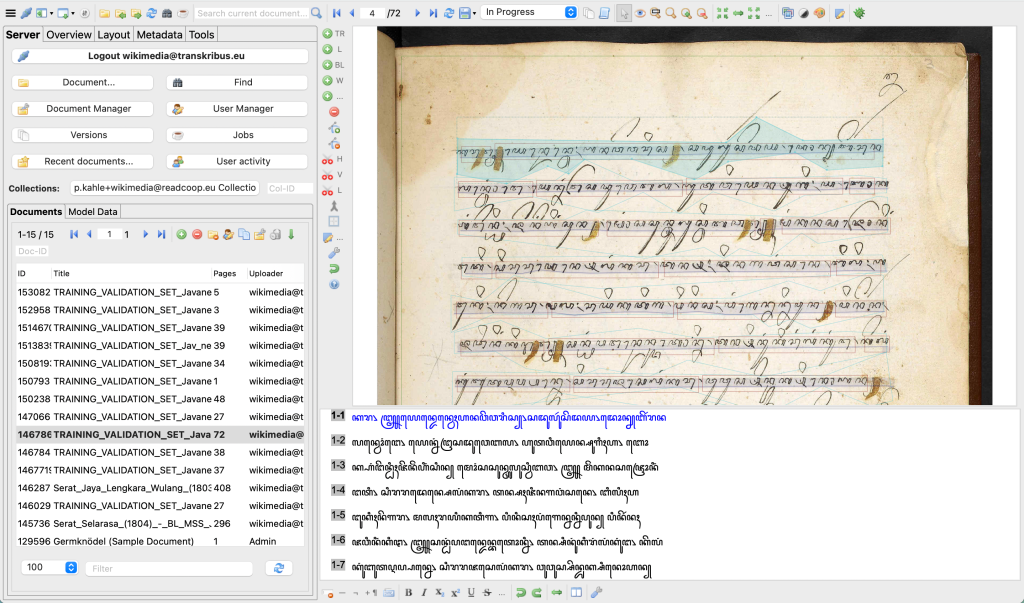The British Library has joined hands with the Wikimedia Foundation to support the Wikisource Loves Manuscripts (WiLMa) project, sharing 76 Javanese manuscripts, including what is probably the largest Javanese manuscript in the world, digitized as part of the Yogyakarta Digitisation Project. The manuscripts, which are now held in the British Library, were taken from the Kraton (Palace) of Yogyakarta following a British attack in June 1812. The British Library’s digitization project was funded by Mr. S P Lohia and included conservation, photography, quality assurance and publication on the Library’s Digitised Manuscripts website, and the presentation of complete sets of digital images to the Governor of Yogyakarta Sri Sultan Hamengkubuwono X, the National Library of Indonesia, and the Library and Archives Board of Yogyakarta.
For the WiLMa project, the scanned images, representing more than 30,000 pages, were merged into pdfs and uploaded to Wikimedia Commons by Ilham Nurwansah, Wikimedian-in-Residence at PPIM and User:Bennylin from the Indonesian community. The manuscripts are now available on Wikimedia Commons in the Category:British Library manuscripts from Yogyakarta Digitisation Project.
“Never before has a library of Javanese manuscripts of such importance been made available to the internet, especially for easy access to the almost 100 million Javanese people worldwide.”
User:Bennylin said about the British Library donation
As a global movement, Wikimedia is able to connect the British Library with communities of origin, who can use the digitized manuscripts to revitalize their language online. As such, the Library has a history of collaboration with the Wikimedia community, hosting Wikimedians-in-Residence and working with the Wikisource community. In 2021, the British Library collaborated with the West Bengal Wikimedians User Group to organize two Wikisource competitions (in Spring and Autumn). Forty rare Bengali books, digitized as a part of their Two Centuries of Indian Print project, were made available on Wikisource. The Bengali Wikisource community has corrected more than 5,000 pages of text, which were OCRed as part of the project.
“As part of our global engagement with Wikimedia communities, we were thrilled to engage in a partnership with the Bengali Wikisource community for the proofreading of rare and unique books digitised as part of the Two Centuries of Indian Print project. We extend our gratitude towards the community’s unwavering commitment and the enthusiasm of its members, which have greatly enhanced the accessibility of these historic gems for readers and researchers.”
Dr. Adi Keinan-Schoonbaert, Digital Curator, British Library
The developing Javanese Wikisource community has already started using the newly digitized Javanese manuscripts in their project, and has plans ranging from transliteration and translation, to recording the content being sung, as originally intended. (“Recording of Ki Sujarwo Joko Prehatin, singing (menembang) the texts of Javanese manuscripts, at the British Library, 12 March 2019; recording by Mariska Adamson”).

The British Library’s collaboration with the Javanese community started earlier this year, when the Wikisource community included three manuscripts from the British Library’s Henry D. Ginsburg Legacy Digitisation Projects in the list of focus texts for a Wikisource competition. Parts of these three long manuscripts were proofread by the community during the competition and now they are being used to create a Handwritten Text Recognition (HTR) model for the Javanese script using Transkribus, as part of our ongoing WiLMa initiative.
Stay tuned for further updates about WiLMa Learning Partners Network!

Can you help us translate this article?
In order for this article to reach as many people as possible we would like your help. Can you translate this article to get the message out?
Start translation